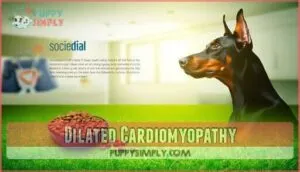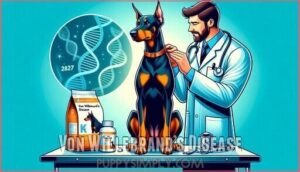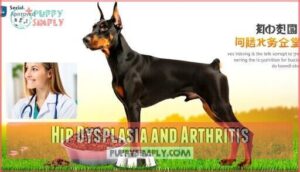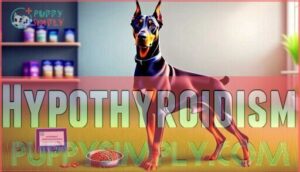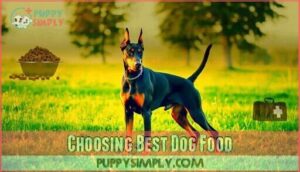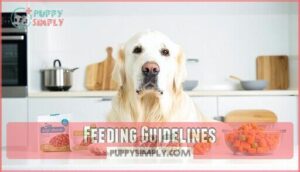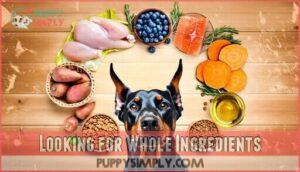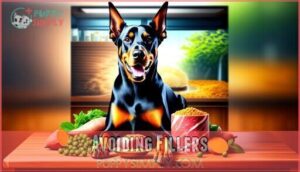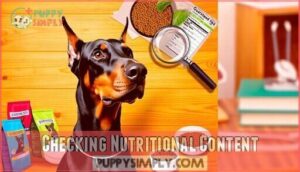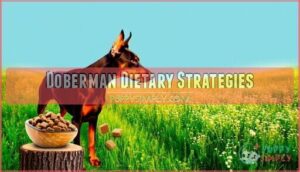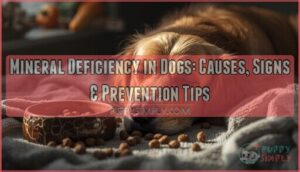This site is supported by our readers. We may earn a commission, at no cost to you, if you purchase through links.
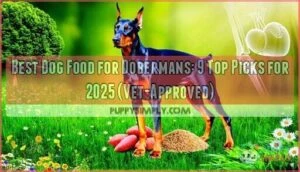
Your Doberman needs high-quality protein for those powerful muscles, plus 15-20% fat content from sources like chicken fat or fish oil.
Skip the generic "meat meals" and aim for specific proteins instead.
Quality carbs like sweet potatoes and brown rice fuel their active lifestyle without the extra weight.
Since Dobermans face heart issues and joint problems more than other breeds, choosing food with balanced minerals and avoiding over-supplementing becomes essential.
The right nutrition isn’t just about energy—it’s about preventing the health challenges that could sideline your athletic companion for years.
Table Of Contents
- Key Takeaways
- Doberman Nutritional Needs
- Health Considerations
- Life Stage Diets
- Choosing Best Dog Food
- Top 9 Best Dog Foods
- 1. Blue Buffalo Large Breed Adult Dog Food
- 2. Wellness Large Breed Dog Food
- 3. Dogswell Hip Joint Chicken Oats
- 4. Natural Balance Lamb Brown Rice Large Breed
- 5. American Journey Large Breed Puppy Food
- 6. Nutro Senior Chicken Rice Dog Food
- 7. Merrick Grain Free Puppy Beef Sweet Potato
- 8. Orijen Puppy Dog Food
- 9. Diamond Naturals Large Breed Chicken
- Feeding Guidelines
- Identifying Quality Dog Food
- Doberman Dietary Strategies
- Selecting Right Food
- Frequently Asked Questions (FAQs)
- How big are Doberman Pinschers?
- What kind of fur does a Doberman Pinscher have?
- What temperament do Doberman Pinschers have?
- How much exercise do Doberman Pinschers need?
- Which health concerns do Doberman Pinschers have?
- What is the best food for a Doberman?
- Is Purina Pro Plan good for Dobermans?
- What are Dobermans most allergic to?
- What is the best dog food for a Doberman?
- Can Dobermans eat chicken?
- Conclusion
Key Takeaways
- You’ll need high-quality protein as the first ingredient – choose specific meats like chicken, beef, or fish rather than generic "meat meals" to fuel your Doberman’s powerful muscles and active lifestyle.
- Balance fat content at 15-20% from quality sources – animal-based fats like chicken fat and fish oil provide essential fatty acids for coat health and sustained energy without excess weight gain.
- Focus on heart-healthy nutrition due to DCM risk – up to 58% of Dobermans develop dilated cardiomyopathy, making taurine levels and avoiding grain-free diets with pulse ingredients crucial for cardiac health.
- Feed twice daily with proper portions to prevent bloat – split your Doberman’s daily calories (around 2,100 for adults) into smaller meals and wait 60 minutes after eating before vigorous exercise to reduce bloat risk.
Doberman Nutritional Needs
Your Doberman’s nutritional needs are as unique as their sleek, muscular build and boundless energy.
Understanding these specific requirements will help you choose the right food to keep your loyal companion healthy, strong, and ready for anything life throws their way, with complete concepts of nutrition in mind, and focusing on unique needs.
Protein Requirements
Your Doberman’s muscles need top-quality protein to stay strong and healthy. Lean meat-based proteins should make up the foundation of their diet, with adult dogs requiring 25-35% protein content for ideal muscle maintenance.
Here’s what to prioritize:
- Real meat as the first ingredient – chicken, beef, or fish
- Complete amino acid profiles – essential for muscle development
- High biological value proteins – easily absorbed by your dog’s system
Look for foods with specific meat content rather than generic "meat meals." Your Doberman’s high energy levels and muscular build demand quality protein sources that deliver complete nutrient balance for sustained health.
Fat Intake
While your Doberman needs adequate fat for ideal coat quality and sustained energy levels, balance is key.
Animal-based fats from sources like chicken fat and fish oil provide essential fatty acids that support brain function and maintain that glossy coat you love.
Aim for 15-20% fat content in your doberman food to fuel their high-energy lifestyle without excess weight gain, ensuring they receive the necessary nutrients for a high-energy lifestyle.
Carbohydrate Sources
Quality carbohydrates fuel your Doberman’s active lifestyle without weighing them down.
Choose digestible carbs like sweet potatoes, brown rice, and oats over cheap fillers. Grain alternatives such as peas and lentils work well for sensitive dogs.
Look for dog food formulations with 25% carb percentage maximum. High fiber content supports digestion while providing steady energy source for daily activities.
Some owners opt for best low carb options for health benefits.
Vitamin and Mineral Needs
Beyond carbohydrates, your Doberman’s body runs on essential vitamins and minerals that keep everything humming smoothly.
These nutrients support immune function, bone development, and energy metabolism.
Watch for deficiency signs like dull coat or lethargy, but avoid over-supplementing—toxicity risks are real.
Quality Doberman food provides balanced mineral ratios, though supplement timing matters for ideal absorption.
Health Considerations
When you’re choosing the best food for your Doberman, you’ll need to take into account their unique health challenges that can substantially impact their dietary needs.
Dobermans are prone to specific conditions like dilated cardiomyopathy, Von Willebrand’s disease, hip dysplasia, and hypothyroidism that require targeted nutritional support to help manage symptoms and maintain quality of life.
Dilated Cardiomyopathy
Heart disease hits up to 58% of Doberman Pinschers, making dilated cardiomyopathy DCM their biggest health threat.
DCM strikes most Dobermans—nutrition is your strongest weapon against their deadliest enemy
Heart disease strikes most Dobermans—making nutrition your best defense against their #1 killer.
This genetic predisposition stems from titin gene mutations that weaken heart muscle over time.
Taurine deficiency and grain-free concerns have sparked debate about doberman food choices.
L-carnitine benefits and omega-3 dosage become essential supplements for supporting cardiac function in affected dogs.
Early detection is paramount, so consider annual echocardiograms for Dobermans.
Von Willebrand’s Disease
Another blood disorder affecting up to 73% of American Doberman Pinschers is Von Willebrands Disease. This genetic condition causes excessive bleeding during surgery or trauma.
VWD genetics involve chromosome 27 mutations, making diagnostic testing essential before procedures. While most dogs show mild symptoms, proper bleeding management includes avoiding blood-thinning medications and using specialized Doberman food with vitamin K.
Supplement benefits from omega-3s support clotting function alongside medication options like desmopressin when needed. Dobermans with this condition often have low vWF levels, which impacts their blood clotting ability.
Hip Dysplasia and Arthritis
Hip dysplasia affects approximately 7% of Doberman Pinschers, leading to painful arthritis that limits mobility.
Weight Management and Anti-inflammatory Diet choices become your dog’s best allies against joint deterioration. Early Detection through veterinary screening helps prevent severe complications.
Joint Supplements that support your Doberman’s comfort:
- Glucosamine and chondroitin – Rebuild cartilage and reduce inflammation
- Omega-3 fatty acids – Fight joint pain naturally
- Green-lipped mussel extract – Provides powerful anti-inflammatory benefits
Large breed food formulated for joint health reduces Exercise Impact on vulnerable hips.
Hypothyroidism
When your Doberman’s thyroid isn’t pulling its weight, you’ll need specific nutrients to get things back on track.
Hypothyroidism requires lean proteins packed with iodine, selenium, and zinc for proper thyroid support and overall Doberman health.
| Nutrient | Food Sources | Benefits |
|---|---|---|
| Iodine Sources | Seaweed, fish, eggs | Regulates thyroid hormone production |
| Selenium Benefits | Brazil nuts, tuna, chicken | Protects thyroid from oxidative damage |
| Zinc Importance | Beef, pumpkin seeds, spinach | Converts T4 to active T3 hormone |
Life Stage Diets
Your Doberman’s nutritional needs change dramatically as they grow from energetic puppies to wise seniors.
Getting their diet right at each life stage isn’t just about keeping them fed—it’s about fueling their best health for years to come, which is crucial for their overall health.
Puppy Feeding Guidelines
Your Doberman puppy’s nutritional journey starts with understanding their rapid growth needs.
These growing athletes require approximately 1,800 calories daily and benefit from a structured feeding approach.
Here’s your puppy feeding roadmap:
- Calorie Requirements: Provide 1,800 daily calories through high-quality puppy food
- Growth Monitoring: Track weight weekly to adjust portions accordingly
- Meal Frequency: Feed 3-4 small meals daily until 6 months old
- Supplement Needs: Add calcium-phosphorus balance for proper bone development
- Weaning Process: Switch gradually from mother’s milk to solid doberman nutrition around 8 weeks
Choose puppy-specific dog food for puppies formulated for large breeds.
This doberman diet foundation supports their muscular development while preventing joint issues later in life.
Consider purchasing food specifically designed for a large breed puppy.
Adult Feeding Requirements
Adult Doberman Pinschers thrive on 2,100 calories daily, though activity levels dramatically impact your calorie calculation needs.
Working dogs may require over 3,000 calories, while less active adults need fewer.
Maintain proper macronutrient balance with 25-35% protein and 15-20% healthy fats.
Feed twice daily to support ideal meal frequency and hydration needs.
Consider where to buy food for your Doberman. Choose the best doberman food that matches your dog’s energy demands for ideal doberman nutrition.
Senior Dog Nutrition
Aging gracefully means adjusting your Doberman’s diet for their golden years. Senior dogs need fewer calories due to reduced activity levels, but they require easily digestible proteins for muscle maintenance.
Focus on senior dog food with joint support ingredients like glucosamine and chondroitin. Calorie reduction helps prevent weight gain while digestibility focus aids their slower metabolism.
Look into specialized options for Doberman senior nutrition. Consider cognitive health supplements and make certain adequate nutrition supports your aging Doberman Pinscher’s overall joint health and well-being.
Pregnant Doberman Diet
Pregnancy changes everything for your doberman’s nutrition needs.
When expecting, your doberman becomes a nutritional powerhouse—fuel her transformation with care
Starting at week five, you’ll need to gradually increase her food portions up to 50% more by delivery.
Switch to high-quality puppy food or all life stages formulas that provide at least 22-28% protein and 17% fat for ideal fetal development.
Feed multiple small meals daily to accommodate her shrinking belly space.
After whelping, lactation demands can quadruple her caloric needs, which requires careful management to ensure her health and the health of her puppies, involving ideal fetal development.
Choosing Best Dog Food
Choosing the right dog food for your Doberman isn’t just about grabbing the first bag off the shelf—it’s about understanding what makes their powerful bodies tick.
You’ll need to balance key nutritional factors, dodge problematic ingredients, and decide between grain-free options and traditional kibble versus wet food.
Key Nutritional Factors
Selecting superior nutrition becomes your greatest ally in supporting your Doberman’s health.
Focus on protein sources like chicken, beef, or fish as primary ingredients. Healthy fats from salmon oil support coat shine and joint function.
Digestible carbs from sweet potatoes provide sustained energy. Vitamin balance guarantees immune system strength, while mineral needs support bone development.
Quality Doberman diet planning prioritizes these Doberman Pinscher nutrition essentials for peak Doberman health, ensuring a well-rounded approach to your dog’s nutrition.
Ingredients to Avoid
When choosing dog food for your Doberman, you’ll want to steer clear of certain harmful additives and low-quality ingredients.
Avoid artificial colors, artificial flavors, and excessive fillers like corn meal or wheat gluten.
Skip foods with toxic ingredients such as BHA, BHT, or ethoxyquin.
Watch out for meat byproducts and chemical additives that offer no nutritional value.
These dog food ingredients can trigger allergies or digestive issues in sensitive Dobermans.
Grain-Free Diets
Most Doberman owners wrestle with whether grain-free food benefits their dog’s health.
While grain-free benefits appeal to allergy concerns, veterinarians warn about the DCM link in Doberman Pinschers.
Consider these facts:
- Less than 1% of dogs have true grain allergies
- DCM risk increases with pulse-heavy ingredient alternatives
- Grain-inclusive diets provide essential nutrients
- Cost analysis shows minimal health advantages
- Best doberman food typically includes wholesome grains
Choose grain-inclusive options unless your vet confirms specific allergies.
Dry Kibble Vs Wet Food
Both dry kibble and wet food offer unique benefits for your Doberman’s nutritional needs.
Kibble benefits include convenience, dental health support, and lower cost comparison, while wet food pros feature higher palatability factors and better hydration source.
Most Dobermans thrive on high-quality dry food, but picky eaters often prefer wet food’s enhanced taste and texture.
Top 9 Best Dog Foods
You’ve narrowed down your search, but choosing the right food for your Doberman can still feel overwhelming with so many options claiming to be "the best."
We’ve done the research and tested these nine top-rated foods to help you make an informed decision that’ll keep your Dobie healthy and thriving.
1. Blue Buffalo Large Breed Adult Dog Food
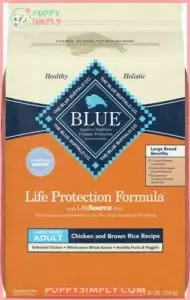
Blue Buffalo stands out as a top choice for your Doberman Pinscher’s nutritional needs.
This large breed dog food delivers real chicken as the first ingredient, ensuring high-quality protein sources your active companion craves.
- Ingredient Analysis: Real deboned chicken plus wholesome grains provide balanced nutrition
- Breed Suitability: Formulated specifically for large breed dogs with appropriate kibble size
- Cost Comparison: Premium pricing reflects quality ingredients and proven track record
Customer reviews consistently praise this adult dog food for maintaining healthy weight and shiny coats in Dobermans.
2. Wellness Large Breed Dog Food
Wellness Complete Health Large Breed delivers premium nutrition with carefully selected Wellness Ingredients that support your Doberman Pinscher’s unique needs.
This Grain Inclusive formula includes probiotics for digestive health and glucosamine for joint health – perfect for active large breed dogs.
The Life-Stage Formulas guarantee your dog gets age-appropriate nutrition, while Probiotic Benefits promote superior gut health for better nutrient absorption.
3. Dogswell Hip Joint Chicken Oats
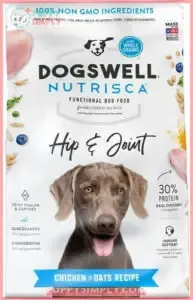
Targeting joint health concerns, Dogswell Hip Joint Chicken Oats delivers targeted nutrition for your Doberman Pinscher’s mobility needs.
This dog food combines quality Dogswell ingredients with functional benefits.
Key joint support features include:
- Glucosamine supplementation – Supports cartilage health and joint function
- Chicken benefits – High-quality protein for muscle maintenance around joints
- Oats digestion – Gentle carbohydrate source that’s easy on sensitive stomachs
Dogswell’s brand reputation centers on functional nutrition, making this formula ideal for Dobermans showing early joint stiffness.
4. Natural Balance Lamb Brown Rice Large Breed
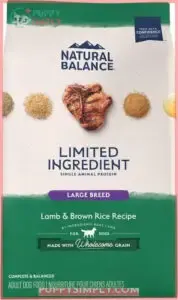
Natural Balance offers your Doberman Pinscher a gentle solution if food allergies plague your large breed dog.
This lamb meal and brown rice formula targets sensitive stomachs with limited ingredients.
The lamb protein supports muscle development while brown rice provides easily digestible carbohydrates.
Natural Balance eliminates common allergens, making it ideal for Dobermans with dietary sensitivities or digestive issues.
5. American Journey Large Breed Puppy Food
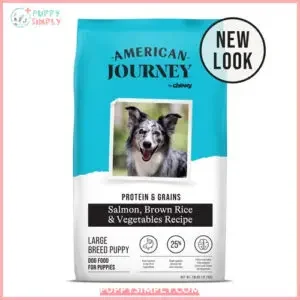
American Journey Large Breed Puppy Food targets growing Doberman Pinscher puppies with breed-specific nutrition.
This puppy food balances protein and calcium for healthy development while staying budget-friendly.
Key highlights include:
- DHA-enriched formula supports brain and eye development
- Controlled calcium levels prevent rapid growth issues in large breeds
- Real deboned chicken as the first ingredient guarantees quality protein
Feeding trials confirm this formula meets AAFCO standards for large breed puppy nutrition.
6. Nutro Senior Chicken Rice Dog Food
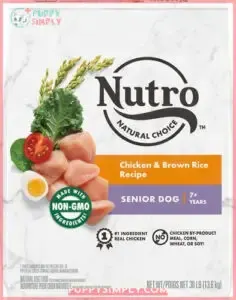
Choosing the right senior dog food becomes vital as your Doberman ages.
Nutro senior chicken rice dog food delivers premium nutro ingredients specifically formulated for senior dogs’ changing needs.
The high-quality chicken source provides easily digestible protein while rice quality guarantees gentle carbohydrates.
This brand reputation stems from decades of research into senior benefits like joint support and enhanced digestibility for aging Dobermans.
7. Merrick Grain Free Puppy Beef Sweet Potato
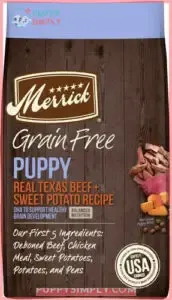
Merrick’s grain-free puppy food delivers premium beef quality and sweet potato benefits that fuel your growing Doberman Pinscher’s development.
This puppy food supports ideal puppy digestion while meeting the doberman breed’s high-energy demands.
Key Features:
- Real deboned beef provides essential protein for muscle development
- Sweet potatoes offer digestible carbohydrates and natural fiber
- Grain-free formula reduces potential digestive sensitivities
- Added vitamins support immune system and cognitive growth
8. Orijen Puppy Dog Food
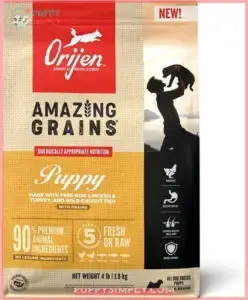
Boasting freeze-dried raw ingredients, Orijen delivers biologically appropriate nutrition that mirrors your Doberman Pinscher’s ancestral diet.
This premium puppy food contains 85% animal ingredients, supporting robust puppy development through high-quality proteins and essential nutrients for large breed growth.
| Feature | Details | Benefits |
|---|---|---|
| Orijen Ingredients | 85% meat, 15% fruits/vegetables | Natural puppy development support |
| Feeding Amounts | 1-3 cups daily (varies by age) | Proper portion control for breed suitability |
| Cost Analysis | $80-90 per 25lb bag | Premium investment in puppy health |
9. Diamond Naturals Large Breed Chicken
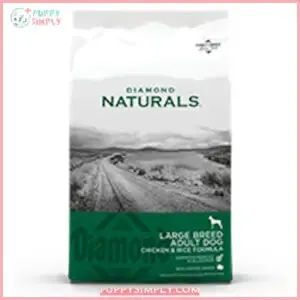
If you’re budget-conscious but won’t compromise on quality, Diamond Naturals delivers exceptional value for your Doberman.
This affordable kibble packs 750mg/kg glucosamine and 250mg/kg chondroitin for joint support, plus 80 million probiotics per pound for digestive health.
Real cage-free chicken leads the ingredient list, delivering 23-26% protein to fuel your dog’s muscular build.
The pea-free formula sidesteps common allergens while providing balanced nutrition that won’t break the bank.
Best For: Budget-conscious Doberman owners seeking quality nutrition with joint support and digestive benefits without premium pricing.
- Some dogs may experience initial digestive adjustment requiring gradual transition period
- Packaging quality issues reported with torn bags during shipping
- Limited availability may require purchasing from specific retailers for best pricing
- High glucosamine content (750mg/kg) and probiotics (80 million CFU/lb) support joint health and digestion at an affordable price point
- Real cage-free chicken as first ingredient provides 23-26% protein for muscle development in large breeds
- Pea-free formula avoids common allergens while including beneficial superfoods and omega fatty acids
Feeding Guidelines
Getting the feeding amounts and timing right for your Doberman isn’t just about filling their bowl—it’s the foundation for their long-term health and energy levels.
You’ll need to take into account their life stage, activity level, and individual metabolism to create a feeding routine that keeps them thriving without the risk of bloat or weight gain.
How Much to Feed
Your Doberman Pinscher needs specific portion sizes based on individual needs.
Adult Dobermans typically require 2,100 calories daily, while puppies need around 1,800 calories.
Working dogs may need over 3,000 calories.
Use calorie calculation methods, adjusting intake based on your dog’s activity level to confirm proper dog portion sizes match your dog’s metabolism and energy requirements, and monitor weight regularly.
How Often to Feed
Feeding your Doberman Pinscher twice daily works best for most adults.
Scheduled feeding beats free feeding since it helps with portion control and prevents overeating.
Morning and evening meals spaced 8-12 hours apart support healthy digestion.
Puppies need more frequent meals – three to four times daily.
Activity impact matters too; working dogs may benefit from post-exercise snacks, and it’s essential to time treats between regular meals to maintain a balanced diet and support healthy digestion.
Feeding Schedules
Consistency matters when establishing your Doberman Pinscher’s dog feeding schedule. Most adults thrive on scheduled feeding twice daily—morning and evening meals work best.
This time restricted approach prevents overeating and supports digestive health. Avoid free-feeding, which can lead to bloat in this breed.
Stick to regular meal frequency and portion timing to help your dog’s body anticipate meals and maintain healthy metabolism. For large breeds, growth sensitivity is a vital consideration during puppyhood.
Portion Control
Proper portion control keeps your Doberman Pinscher at ideal weight and prevents overeating-related health issues.
Use a dog calorie calculator and measure food precisely for accurate dog food portion sizes.
- Calculate daily calories based on age, weight, and activity level
- Measure portions using a kitchen scale rather than eyeballing amounts
- Include treats in total daily intake (maximum 10% of calories)
- Adjust portions regularly based on body condition and weight changes
Monitor your dog’s weight management through regular weigh-ins and body condition assessments.
Identifying Quality Dog Food
When choosing dog food for your Doberman, you’ll need to read ingredient lists like a detective looking for clues.
Focus on whole ingredients, avoid unnecessary fillers, and check that the nutritional content matches your dog’s specific needs, which involves considering complete concepts to make an informed decision.
Looking for Whole Ingredients
Quality ingredients matter more than fancy marketing when choosing dog food for your Doberman Pinscher.
Look for real food sources you can pronounce and recognize.
| Whole Ingredients | Processed Alternatives | What It Means |
|---|---|---|
| Deboned chicken | Chicken meal | Fresh meat vs rendered |
| Sweet potatoes | Potato starch | Whole vegetable vs extract |
| Blueberries | Natural flavoring | Real fruit vs artificial |
| Salmon oil | Fish by-products | Pure source vs leftovers |
| Spinach | Vegetable powder | Minimally processed vs heavily refined |
Ingredient sourcing and food transparency help you make informed choices.
Human-grade ingredients and high-quality ingredients guarantee your dog gets the best nutrition from minimally processed sources that address ethical concerns.
Avoiding Fillers
Skip fillers like corn, wheat, and meat by-products that offer empty calories without nutritional value.
Your Doberman Pinscher needs real ingredients, not artificial additives that cause digestibility concerns.
Choose filler alternatives like sweet potatoes or peas that support long-term health and provide actual nutrients for superior dog food quality.
Checking Nutritional Content
Beyond avoiding fillers, you need to examine the guaranteed analysis panel like a nutrition detective.
Look for macronutrient ratios that match your Doberman Pinscher’s needs and verify AAFCO standards compliance.
- Protein content should exceed 25% for adult Dobermans
- Calorie density must align with your dog’s activity level
- Ingredient sourcing transparency indicates quality manufacturing
- Guaranteed analysis shows minimum nutritional values, not maximums
Doberman Dietary Strategies
Your Doberman’s dietary needs extend beyond basic nutrition to address breed-specific health challenges that require strategic food choices.
The right feeding approach can help prevent bloat, support heart health, and maintain your dog’s athletic build throughout their life.
Managing Health Issues
Target your Doberman Pinscher’s diet to address breed-specific health concerns like DCM, bloat, and hip dysplasia.
Choose foods with taurine for dilated cardiomyopathy management, while avoiding high-copper formulas if your dog shows signs of copper hepatopathy.
Support thyroid health with iodine-rich ingredients and add joint support supplements for ideal mobility and comfort.
Preventing Bloat
Bloat prevention starts with smart feeding habits that keep your Doberman Pinscher safe from this dangerous condition.
Feed smaller, frequent meals instead of one large portion to reduce stomach distension and gas buildup.
- Meal Frequency: Split daily food into 2-3 smaller servings
- Exercise Timing: Wait 60 minutes after eating before vigorous activity
- Slow Feeders: Use puzzle bowls to prevent rapid eating and air swallowing
Supporting Joint Health
Your Doberman Pinscher needs joint support to stay active throughout their life. Large breed dogs face unique challenges, but proper nutrition makes a difference.
Grain-free options may improve joint health by reducing inflammation.
| Nutrient | Joint Health Benefit |
|---|---|
| Glucosamine | Rebuilds cartilage and reduces inflammation |
| Chondroitin | Maintains cartilage elasticity and shock absorption |
| Omega-3s | Reduces joint inflammation and stiffness |
| Controlled Calories | Prevents excess weight stress on joints |
| Balanced Minerals | Supports bone density and joint structure |
Weight management matters most—extra pounds strain joints unnecessarily. Exercise impact varies, so balance activity with recovery time.
Maintaining Coat Health
Your Doberman’s shiny coat reflects good nutrition from within.
Omega-3 fatty acids support skin health and reduce coat problems in your Doberman Pinscher. Quality proteins provide building blocks for healthy fur growth.
Biotin supplementation helps prevent zinc deficiency that causes dull coats. Hydration importance can’t be overlooked—proper water intake keeps skin supple and coat lustrous, with omega-3 fatty acids and quality proteins being essential for overall health.
Selecting Right Food
Choosing the right food for your Doberman requires careful consideration of several key factors that directly impact their health and wellbeing.
You’ll need to match the food to your dog’s specific life stage, activity level, and any health concerns while working closely with your veterinarian to guarantee proper nutrition.
Considering Life Stage
Your Doberman Pinscher’s nutritional needs change dramatically throughout their life.
Puppy nutrition requires higher calories and protein for rapid growth, while adult dog food focuses on maintenance.
Senior dogs need easily digestible formulas with joint support.
Pregnancy needs increase caloric demands substantially, and Breed specific puppy food formulas can help guarantee proper development.
Choose life stage-appropriate formulas and limit treat intake to 10% of daily calories.
Evaluating Activity Level
Your dog’s activity level directly impacts their Energy Expenditure and nutritional needs.
A couch-potato Doberman Pinscher requires fewer calories than one with an intense Exercise Regimen.
Working dogs need high protein food to fuel their Training Intensity, while less active dogs risk weight gain.
Match your dog food to their Performance Metrics and daily routine for ideal nutrition.
Consulting With Veterinarian
Every responsible Doberman Pinscher owner should partner with their veterinarian when selecting dog food, especially given breed predispositions to specific health issues.
Your vet understands your dog’s unique needs and can guide dietary changes effectively, considering breed predispositions to specific health issues.
- Schedule regular check-ups to discuss food allergies and nutritional requirements
- Ask about supplement advice for joint health and heart conditions
- Review symptom monitoring strategies for digestive issues or sensitivities
Consider consultations with online registered vet nutritionist through Vetster for specialized guidance, and request breed-specific recommendations based on your Doberman’s age and activity level.
This approach ensures that your Doberman Pinscher receives the best possible care, tailored to their unique needs and health status, with a focus on dietary changes and overall well-being.
Monitoring Health and Adjusting Diet
Keep an eye on your Doberman Pinscher’s weight management, energy levels, and stool consistency—these are your daily clues about health and nutrition.
If allergy symptoms pop up or hydration needs seem off, it’s time to rethink dog food.
Adjust portions and ingredients as needed, and remember, a happy, healthy Doberman thrives when you monitor and tweak their diet like a pro.
Frequently Asked Questions (FAQs)
How big are Doberman Pinschers?
You’ll find these athletic dogs typically weigh 60-100 pounds and stand 24-28 inches tall at the shoulder.
Males are generally larger than females, with their sleek, muscular build making them impressive companions.
What kind of fur does a Doberman Pinscher have?
Your Doberman sports a sleek, short double coat that’s both smooth and close-fitting. This low-maintenance fur sheds moderately year-round, requiring weekly brushing to keep it looking sharp and healthy.
What temperament do Doberman Pinschers have?
You’ll find these intelligent dogs are naturally alert, loyal, and protective. They’re fearless guardians who bond deeply with their families while remaining naturally suspicious of strangers, making excellent watchdogs.
How much exercise do Doberman Pinschers need?
High energy, high demands, high rewards – you’ll need at least 2 hours daily of vigorous exercise. Running, hiking, and mental challenges keep these athletic dogs happy and well-behaved.
Which health concerns do Doberman Pinschers have?
You’ll face several serious health challenges with your Doberman, including dilated cardiomyopathy, bloat, hip dysplasia, hypothyroidism, Von Willebrand’s disease, and copper-associated hepatopathy, requiring proactive veterinary care and monitoring.
What is the best food for a Doberman?
You’ll want high-quality protein as the foundation, with brands like Purina Pro Plan Large Breed, Taste of the Wild, or Ollie offering excellent nutrition that supports your Doberman’s muscular build and energy needs.
Is Purina Pro Plan good for Dobermans?
Absolutely, Purina Pro Plan’s an excellent choice for your Doberman.
It meets WSAVA guidelines, undergoes feeding trials, and offers large breed formulas specifically designed for Dobermans’ nutritional needs and health requirements.
What are Dobermans most allergic to?
Dobermans commonly develop allergies to chicken, beef, wheat, corn, and soy. Environmental triggers like pollen, dust mites, and certain cleaning products also cause reactions in sensitive dogs.
What is the best dog food for a Doberman?
Choose high-protein kibble like Purina Pro Plan Large Breed or Taste of the Wild High Prairie.
You’ll want 25-35% protein content with quality animal sources, joint supplements, and smaller kibble size for your Doberman’s needs.
Can Dobermans eat chicken?
Yes, chicken is safe for Dobermans and makes an excellent protein source.
It’s digestible, lean, and commonly found in quality dog foods.
Just make certain it’s cooked properly and avoid seasoning or bones that could harm your pup, as chicken can be a very lean addition to their diet when prepared correctly.
Conclusion
Feeding your Doberman properly isn’t rocket science, but it’s not guesswork either.
While some owners stress over every ingredient, others grab whatever’s on sale—both approaches miss the mark.
The best dog food for Dobermans balances high-quality protein, appropriate fat levels, and essential nutrients without breaking your budget.
Remember, you’re investing in your dog’s long-term health and happiness.
Choose wisely, feed consistently, and watch your athletic companion thrive for years to come.

